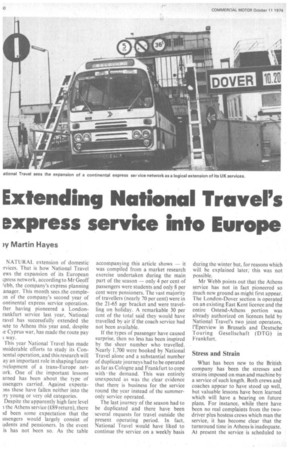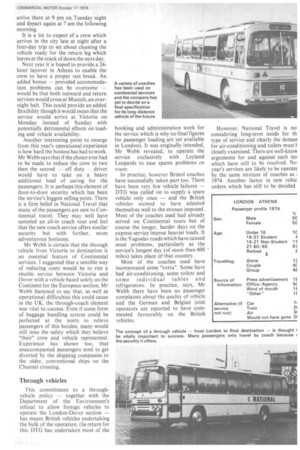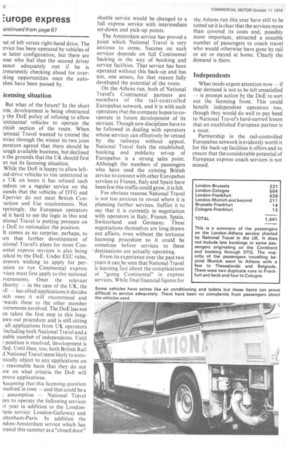Extending National Travel's express service into Europe
Page 62

Page 63

Page 64

If you've noticed an error in this article please click here to report it so we can fix it.
nt Martin Hayes
NATURAL extension of domestic rvices. That is how National Travel ews the expansion of its European cpress network, according to Mr Geoff 'ebb, the company's express planning anager. This month sees .the complean of the company's second year of ontinental express service operation. fter having pioneered a Londonrankfurt service last year, National ravel has successfully extended the iute to Athens this year and, despite [e Cyprus war, has made the route pay way.
This year National Travel has made msiderable efforts to study its Coniental operation, and this research will ay an important role in shaping future ;velopment of a trans-Europe net-. ork. One of the important lessons arned has been about the type of issengers carried. Against expectamis these have fallen neither into the [ry young or very old categories.
Despite the apparently high fare level the Athens service (E89 return), there id been some expectation that the issengers would largely consist of udents and pensioners. In the event is has not been so. As the table accompanying this article shows — it was compiled from a market research exercise undertaken during the main part of the season — only 4 per cent of passengers were students and only 8 per cent were pensioners. The vast majority of travellers (nearly 70 per cent) were in the 21-65 age bracket and were travelling on holiday. A remarkable 30 per cent of the total said they would have travelled by air if the coach service had not been available.
If the types of passenger have caused surprise, then no less has been inspired by the sheer number who travelled. Nearly 1,700 were booked by National Travel alone and a substantial number of duplicate journeys had to be operated as far as Cologne and Frankfurt to cope with the demand. This was entirely unexpected as was the clear evidence that there is business for the service round the year instead of the summeronly service operated.
The last journey of the season had to be duplicated and there have been several requests for travel outside the present operating period. In fact, National Travel would have liked to continue the service on a weekly basis during the winter but, for reasons which will be explained later; this was not possible.
Mr Webb points out that the Athens service has not in fact pioneered so much new ground as might first appear. The London-Dover section is operated on an existing East Kent licence and the entire Ostend-Athens portion was already authorized on licences held by National Travel's two joint operators, l'Eperview in Brussels and Deutsche Touring Gesellschaft (DTG) in Frankfurt.
Stress and Strain
What has been new to the British company has been the stresses and strains imposed on man and machine by a service of such length. Both crews and coaches appear to have stood up well, but valuable lessons have been learned which will have a bearing on future plans. For instance, while there have been no real complaints from the twodriver plus hostess crews which man the service, it has become clear that the turnround time in Athens is inadequate. At present the service is scheduled to arrive there at 9 pm on Tuesday night and depart again at 7 am the following morning.
It is a lot to expect of a crew which arrives in the city late at night after a four-day trip to set about cleaning the vehicle ready for the return leg which leaves at the crack of dawn the next day.
Next year it is hoped to provide a 24hour layover in Athens to enable the crew to have a proper rest break. An added bonus provided accommodation problems can be overcome — would be that both outward and return services would cross at Munich, an overnight halt. This could provide an added flexibility though it would mean that the service would arrive at Victoria on Monday instead of Sunday with potentially detrimental effects on loading and vehicle availability.
Another interesting point to emerge from this year's operational experience is how hard the hostess has had to work. Mr Webb says that if the choice ever had to be made to reduce the crew to two then the second — off duty driver would have to take on a heavy additional load of caring for the passengers. It is perhaps this element of door-to-door security which has been the service's biggest selling point. There is a firm belief in National Travel that many of the passengers are new to Continental travel. They may well have sampled an all-in coach tour and feel that the new coach service offers similar security but with further, more adventurous horizons.
Mr Webb is certain that the through vehicle from Victoria to destination is an essential feature of Continental services. I suggested that a sensible way of reducing costs would be to run a shuttle service between Victoria and Dover with a vehicle based solely on the Continent for the European section. Mr Webb hastened to say that, as well as operational difficulties this could cause in the UK, the through-coach element was vital to success. Even if some form of baggage handling system could be perfected at the ports to relieve passengers of this burden, many would still miss the safety which they believe "their" crew and vehicle represented.
Experience has shown too, that unaccompanied passengers tend to get diverted by the shipping companies to the older, convention-al ships on the Channel crossing.
Through vehicles
This commitment to a throughvehicle policy — together with the Department of the Environment's refusal to allow foreign vehicles to operate the London-Dover section — has meant British vehicles undertaking the bulk of the operation. (In return for this DTG has undertaken most of the booking and administration work for the service which is why no final figures for passenger loading are yet available in London). It was originally intended, Mr Webb revealed, to operate the service exclusively with Leyland Leopards to ease spares problems en route.
In practice, however Bristol coaches have successfully taken part too. There have been very few vehicle failures — DTG was called on to supply a spare vehicle only once — and the British vehicles seemed to have adpated themselves well to the stresses imposed. Most of the coaches used had already served on Continental tours but of course the longer, harder days on the express service impose heavier loads. It is the Yugoslav roads which have caused most problems, particularly as the service's longest day (of more than 600 miles) takes place in' that country.
Most of the coaches used have incorporated some "extra". Some have had air-conditioning, some toilets and some individual tables and refrigerators. In practice, says, Mr Webb there have been no passenger complaints about the quality of vehicle and the German and Belgian joint operators are reported to have commented favourably on the British vehicles. However, National Travel is no. considering long-term needs for th type of service and clearly the deman for air-conditioning and toilets must I closely examined. There are well-know arguments for and against each itei which have still to be resolved. Ne: year's services are likely to be operate by the same mixture of coaches as i 1974. Another factor in new vehic orders which has still to be decided iat of left versus right-hand drive. The :rvice has been operated by vehicles of le latter configuration, but there are lose who feel that the second driver innot adequately rest if he is armanently checking ahead for over;king opportunities once the auto3.hns have been passed by.
icensing situation
But what of the future? In the short ;rm, development is being obstructed y the DoE policy of refusing to allow 'ontinental vehicles to operate the ritish section of the route. When 'ational Travel wanted to extend the ;rvice through the winter its two joint perators agreed that there should be iough available business, but declined n the grounds that the UK should first art out its licensing situation.
While the DoE is happy to allow leftid-drive vehicles to run unlettered in e UK on tours it has refused such :edom on a regular service on the ounds that the vehicles of DTG and Epervier do not meet British Con-uction and Use requirements. Not rprisingly, the European operators id it hard to see the logic in this and itional Travel is putting pressure on DoE to rationalize the position.
It comes as no surprise, perhaps, to irn that further development of ttional Travel's plans for more Conmental express services is also being )cked by the DoE. Under EEC rules, erators wishing to apply for perssion to run Continental express -vices must first apply to thir national wernments. Once the relevant thority — in the case of the UK, the )E -has sifted applications it decides lich ones it will recommend and -wards these to the other member vernments involved. The DoE has not an taken the first step in this longawn out procedure and is still sitting all applications from UK operators including both National Travel and a cable number of independents. Until position is resolved, development is fled. Until then, too, both British Rail d National Travel seem likely to autoitically object to any applications on ; reasonable basis that they do not ow on what criteria the DoE will prove applications. kssuming that this licensing question esolved in time -and that could be a ; assumption — National Travel pes to operate the following services U year in addition to the Londonhens service: London-Galloway and ehenham-Paris. In addition the ndon-Amsterdam service which has :rated this summer as a "closed door" shuttle service would be changed to a full express service with intermediate set-down and pick-up points.
The Amsterdam service has proved a point which National Travel is very anxious to stress. Success on such services depends on full Continental backing in the way of booking and service facilities. That service has been operated without this back-up and has not, one senses, for that reason fully developed the potential of the route.
On the Athens run, both of National Travel's Continental partners are members of the rail-controlled Europabus network, and it is with such operators that the company hopes to cooperate in future development of its services. Though new disciplines have to be followed in dealing with operators whose services can effectively be vetoed by the railways without appeal, National Travel feels the established, booking and publicity set-up of Europabus is a strong sales point. Although the numbers of passengers who have used the existing British service to connect with other Europabus services to France, Italy and Spain have been few this traffic could grow, it is felt.
For obvious reasons National Travel is not too anxious to reveal where it is planning further services. Suffice it to say that it is currently in negotiation with operators in Italy, France, Spain, Switzerland and Germany. These negotiations themselves are long drawn out affairs, even without the tortuous licensing procedure so it could be sometime before services to these destinations are actually operating.
From its experience over the past two years it can.be seen that National Travel is learning fast about the complications of "going Continental" in express services. While final financial figures for the Athens run this year have still to be totted up it is clear that the services more than covered its costs and, possibly more important, attracted a sizeable number of passengers to coach travel who would otherwise have gone by rail or air or stayed at home. Clearly the demand is there.
Independents
What needs urgent attention now — if that demand is not to be left unsatisfied — is prompt action by the DoE to sort out the licensing front. This could benefit independent operators too, though they would do well to pay heed to National Travel's hard-earned lesson that an established European partner is a must.
Partnership in the rail-controlled Europabus network is evidently worth it for the back-up facilities it offers and to ensure that the considerable potential of European express coach services is not missed.




























































































































































